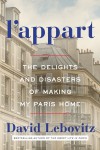19
Followers
19
Following
M Sarki
Besides being a poet with four collections published, M Sarki is a painter, film maker, and photographer. He likes fine coffee and long walks.
M Sarki has written, directed, and produced six short films titled Gnoman's Bois de Rose, Biscuits and Striola , The Tools of Migrant Hunters, My Father's Kitchen, GL, and Cropped Out 2010. More details to follow. Also the author of the feature film screenplay, Alphonso Bow.
Currently reading
L'Appart: The Delights and Disasters of Making My Paris Home
We Learn Nothing: Essays
Elmet: LONGLISTED FOR THE MAN BOOKER PRIZE 2017
Limbo, and Other Places I Have Lived: Short Stories
The Double Life of Liliane
At Home with the Armadillo
American Witness: The Art and Life of Robert Frank
Autumn
Inside Out: A Personal History of Pink Floyd (Reading Edition)
American Witness: The Art and Life of Robert Frank
The End of Days
 http://msarki.tumblr.com/post/108666282228/the-end-of-days-by-jenny-erpenbeck
http://msarki.tumblr.com/post/108666282228/the-end-of-days-by-jenny-erpenbeckThere is an old man back in my home town in Michigan, my place of birth, who sits alone in a chair in a rest home, no longer aware of who he is or what he is doing there, or anywhere. He no longer remembers what certain words mean nor what gadgets are meant to do, or even why tasks have to be performed. The only meaning left in his life are the brief moments of memory that come to him in a flash, but then mostly escape him. It seems his days are spent simply waiting for whatever it is, this life, to end.
But there are countless other ways his life, instead, could have meandered. And Jenny Erpenbeck relates a tale to us in five separate parts that show us how and perhaps what might have happened along the way to the woman she profiles who is afforded the chance to live and to die herself five distinct times.
It may be Erpenbeck’s honesty that is the tie that binds me to her work, her world, and thus, her thinking. Living in my America, a United States full of promise and deception, falsehood and pretension, it is comforting to feel someone is telling me the truth especially in a work of fiction. Jenny Erpenbeck may be the most gifted storyteller living in our midst these days. And by my lights there are not many.
She is obviously a sharp and clever woman, and certainly well-served by a Bernofsky translation. Such a powerful team, and one I am sure will be recognized in time for its several brilliant acts upon the page. There is no telling where a story will go with Erpenbeck at the helm, but it is guaranteed to be interesting and thoughtful to the core.
The first two books in this collection of a total of five interconnected pieces, and each leading to a longer life and different death for an unnamed woman protagonist, were what was predictably expected of Erpenbeck, her typically strong and piercingly good literature. But the third book, in the middle of it all, its focus being on comrades and fellow communists, her detainment and her acquaintances who either became traitors or executed because of their political or religious affiliations, was certainly boring and hard for me to to get a firm handle on. I kept waiting for the reason of my continued reading to reveal itself and to answer finally why I was still attempting to engage with this book when I rarely give another writer the same latitude with my precious time. But historically Erpenbeck has often delivered the goods for me and I expected she would find a way through all this sludge to again knock my socks off. I kept reasoning that this communist party preview was somehow preparing me for a better ending, even if it would ultimately be the protagonist’s own.
The cruelty and bitter truth behind the meaning of this life portrayed in The End of Days is that ultimately by the moment of our death none of it really matters. We have what we have when we have it, and then all is taken away from us. And the very cruelest of these awful days must begin with the ending of language. And though it took Erpenbeck far too long to get to where she was going, the fact remains that she tried. And that is all we can possibly do until we lose our understanding. For me, this Erpenbeck novel could just as easily been titled The End of Words. Compared to the strength and hardness of her previous collections, this book fails. And I must admit, that saddens me.







